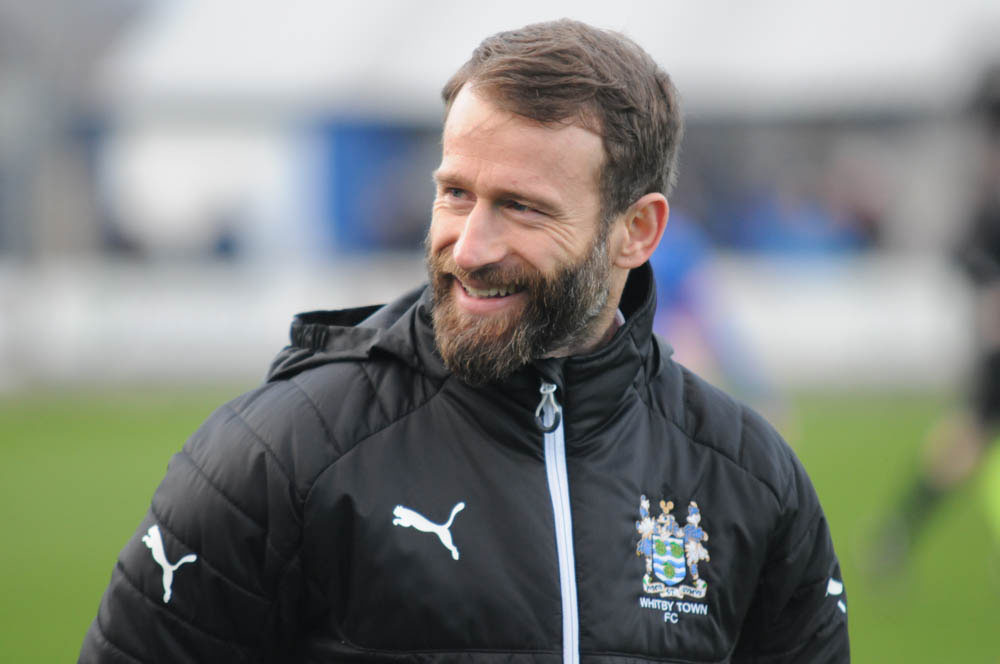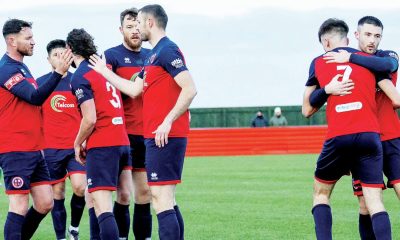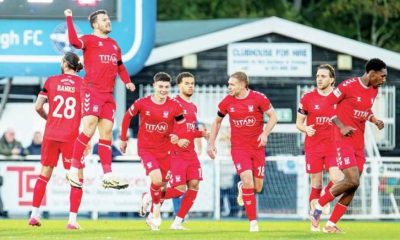
By Kevin Graham
When people think of Whitby, it’s highly likely that Dracula and Captain Cook will come to mind before the football.
One of the Evo Stik Northern Premier League’s most isolated and remote outposts, only Marine have been in that league longer than the town’s football club. Manager Chris Hardy knows just how big an achievement that is.
Having spent the best years of my career at the club when they were in what was then the Unibond Premier League, I was particularly keen to find out how Hardy views the job with the class of 2018…
Is it still just the day trippers who like to come out to Whitby or are you managing to get players in during the close season?
It’s not getting any easier to be honest! We’re delighted to welcome Dale (Hopson – the 33-goal midfielder who Whitby sold to Blyth this time last year) back to the club which is a massive boost and I’m grateful for the support from everyone at the club for helping make it happen.
Last year was a tough season; we need to improve this year and we are looking to bring the right players in. I ask for a three-day week commitment from every player though so it’s not for everyone, particularly when you look at what other clubs in our region are offering.
Is that a location issue or more about finance?
Both are considerable factors – it’s a long way for players to come which will always be a factor and we simply can’t get near what some of the clubs in and around us pay. But it’s not just the likes of Spennymoor, Scarborough and South Shields I’m talking about – the Northern League still offers a lot of good players better money than we pay with the added benefit that they will be home by 6 o’clock on a Saturday evening from most games.
And then of course when you develop players and they start to perform at consistently high levels, the vultures soon appear…
Exactly – it was certainly the case last year when we lost our top goal scorer in Dale and also one of the best goalkeepers anywhere outside the football league, in Shane Bland.
It’s fair to say not all the signings I made last year to replace them fitted and it was my toughest year in management yet. But I learnt a lot. I had enjoyed relative success and managed to improve things every year since I started managing, so it was inevitable at some point.
So how did you get into management in the first place?
I grew up watching Stockton in the Northern League where my father was groundsman – it was a league for tough men playing tough football with the old Mitre Multiplex!
I played, but was a player/coach even back in my early twenties in and around the Teeside League, and I guess I naturally leaned towards the coaching and management side of things even in those days.
I did ok and then Peter Mulcaster took me to Bishop Auckland as a coach, which was my first taste of more serious Non-League football, before I joined Alan Robinson at Thornaby where I started to have more influence on the management side of things. I went to Guisborough with Dean Coates, and when the budget got cut after a disappointing period in 2008, Dean left and I started to manage on my own with limited resources.
And you enjoyed great years at Guisborough despite the modest beginnings there.
I always think you need to try and improve year on year as a minimum. We did that steadily – I had to coach and improve players as I couldn’t just go out and bring in the finished article due to budget constraints.
Going right back to my Teeside League days, I’d always had a knack of improving players so that was probably why the club thought I might be a good fit. As results came, then so too did the organisation and infrastructure, so success on and off the pitch went hand in hand.
By the time I left – and it was the right time for me to go after seven or eight seasons there – we were one of the top sides in the Northern League. We’d had a promotion, success in various cups and produced a lot of top players that were either now at the big payers in the league, higher up in the Non-League pyramid or into the professional game with Danny Johnson joining Cardiff City. They were great days for all of us.
So after a terrific first 18 months at Whitby, how did you deal with what was basically a crisis last season?
It was tough – the league is so strong and the programme is relentless. I’d developed an identity about the way we played in my first full season and that had served us well in a season where we just fell short of the play-offs. Then key players went and new players came in, and we failed to do the basics at both ends of the pitch. We went 14 games without a win and confidence was low.
We had to really look at everything and in the end, I ditched the pattern, the philosophies I had developed, and went back to basics.
I think that’s the first time any coach has been as open and honest about doing that!
We had to – we were very poor and that was my responsibility. After the 5-0 defeat to Lancaster, we came in on the Tuesday and went through the video nasties. It was awful…maybe 250 coaching points in the whole game that we needed to improve. I had to turn it off after 14 mins. So we had to tear up the rule book and start again. We weren’t brilliant after that, but we cut out a lot of the simple mistakes.
I’m not a shouter or screamer, but some home truths were shared as well. Sometimes you need to do it.
We are a very organised club, the processes are methodical and the players know what the schedule is, and how we work. I probably obsess over the detail a little too much but it’s served me well for the most part, so the processes will always remain organised.
We will always make sure the players are prepared. Whether that’s coaching, medical or physical conditioning support, video analysis, logistics…it is an excellent set-up. But we have to perform. To compete at this level we all need to be on point.
And how do you find managing the players now compared to when you started?
I’m almost 900 senior games in as a manager now, and it has changed. The lack of leadership qualities and strength of character is frustrating at times.
I speak to players about coming here and I’m getting referred to parents and agents – it drives me crackers. This is a tough league and it requires players to be able to stand on their own two feet and take responsibility, so when I speak to a player I want to know what he’s about and that he can stand on his own two feet.
In terms of football specifics, the players need to be coached these days. At times it’s disappointing when players come from full-time football but need to be coached on some of the basics, particularly the stuff that affects results, which is at the two ends of the pitch. I’m talking about details like bending your run as a striker, how to play off the shoulder; this used to be a given when players arrived at this level, but the way the game is coached now some of these specifics get missed. We only have limited time together as it is!
So it looks like you’ll need to bring on some rough gems again – it looks like a tougher league than it’s been for a while this coming season.
It is – so many big teams with some serious money flying about as well. Dale coming back improves the attacking quality, and any other players we look to bring in need to be the right characters for this club.
If we can also bring on one or two by working hard at our craft on the training ground, then that will obviously help. If we can use the time we have together wisely, get some repetition work done which will help develop the unit, then we can kick on and really improve.
Harry Dunn said to me when I signed, “you won’t find a better club than Whitby Town” – does that still ring true for you?
Most definitely – of course I’m ambitious and would like to test myself in the full-time game, but I’m also a great believer that the grass is not often greener.
This is a terrific club – well run, financially sound, great facilities, a proud history and a lot of great people. I’m grateful to be here and I want players who want to test themselves – if they do that then we take very good care of them.




















